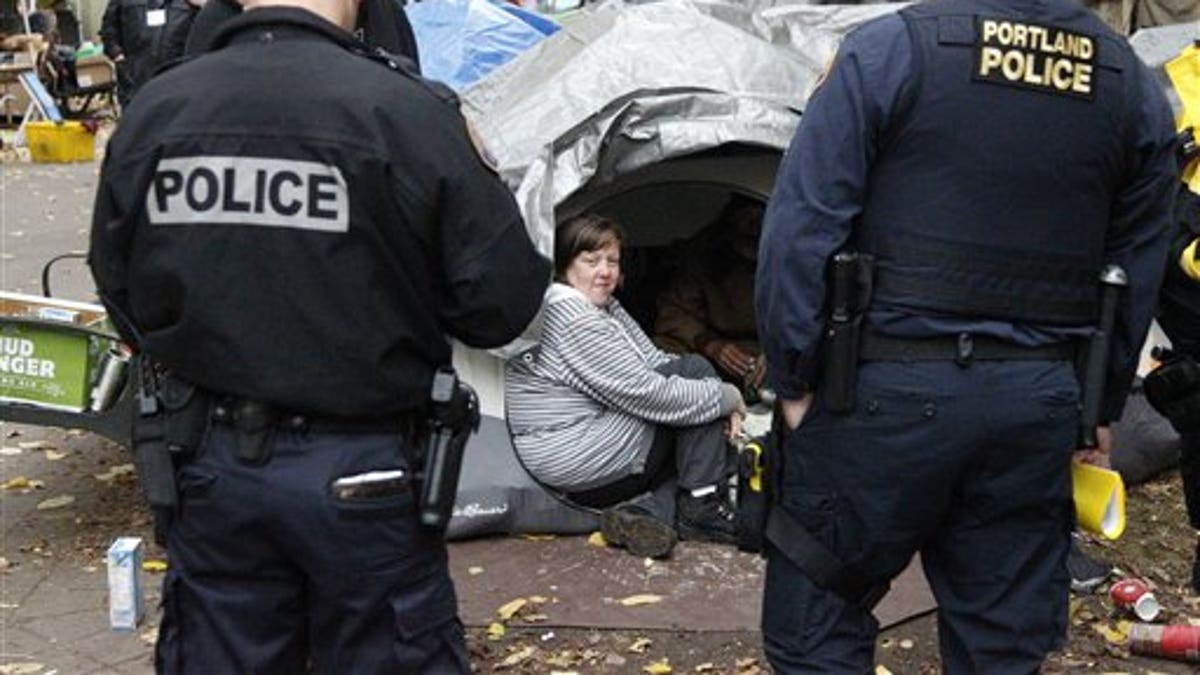
Nov. 11, 2011: Erin Robertson sits in the doorway of a tent while Portland police look on at the Occupy Portland encampment. (AP)
PORTLAND, Ore. – Portland police believe that some protesters inside the Occupy Portland encampments are building shields and makeshift weapons -- including nails hammered into wood -- in preparation for when authorities attempt to clear the parks this weekend, police said Friday.
Occupy Portland organizers have repeatedly said the movement is nonviolent and have appealed to demonstrators to resist peacefully when the camps close at midnight on Saturday. They planned public marches and a potluck dinner before the deadline and hoped the public would take part.
But police said as many as 150 anarchists may come to Portland to take part in a possible clash with officers.
"If there are anarchists, if there are weapons, if there is an intention to engage in violence and confrontation, that obviously raises our concerns," Portland police Lt. Robert King said. "But I know we'll be able work through that and manage that, because we want to protect everyone there, especially the peaceful protester."
Mayor Sam Adams has ordered the camp shut down, citing unhealthy conditions and the encampment's attraction of drug users and thieves.
Protest organizers responded angrily to the police warning on Friday, saying in a statement that the police are trying to "defame" the movement by attributing the actions of individuals to the movement as a whole.
"Anyone that is engaging in violent resistance is doing so in direct contradiction to the values outlined by the Portland General Assembly" -- the movement's democratic governing body -- "and in doing so is by definition not representing Occupy Portland," the statement said.
About 10 demonstrators from Seattle had volunteered to come to Portland on Saturday to "stand in peaceful solidarity," the statement said, but organizers are not calling in a mass influx of out-of-state demonstrators or anarchists.
Some people left the encampment on Friday, while others vowed to stay unless taken away in handcuffs.
The camp population was noticeably thinner as demonstrators cleaned up portions of the park. Some were seen carting away books from the library and dumping articles into trash containers.
A handful of people worked on dismantling an intricate kitchen, saying they'll store donated equipment until the movement can regroup. They're appealing to the public to cook food at home and bring it to demonstrators.
"Food is not going to stop unless we're forced to stop," said Marla Baskin, a demonstrator who has helped to organize food service.
Baskin said she hoped police would be able to arrest nonviolent demonstrators without force, even if radical elements try to provoke a confrontation.
Some demonstrators said they hope the camp may be re-established elsewhere or splintered into several smaller camps to continue the movement, but protest spokesman Jordan LeDoux said in an email "nothing concrete has been decided."
Demonstrators planned marches originating in various locations around Portland on Saturday, ending at the encampments around 5 p.m., followed by a potluck for the public to "celebrate freedom of speech, and support for those who will be arrested," LeDoux said.
The Portland encampment went up Oct. 6 after a march in support of the Occupy Wall Street movement. Protesters were sheltered by donated tents, fed by donated food and cared for by volunteer doctors and nurses. But it became a magnet for people not originally part of the movement. Sanitary conditions worsened. Businesses complained of theft.
City officials' patience began growing thin when activists sought to occupy another park on Oct. 30. Police dragged away 27 of the activists when they refused to leave.
Protesters marched over two bridges on Nov. 2, but declined to inform police about the march route. That forced officers on bicycles, motorcycles and in squad cars to follow and block traffic for more than an hour. An officer was pushed into a moving bus sometime near the end of the march, police said. He received just minor injuries.

